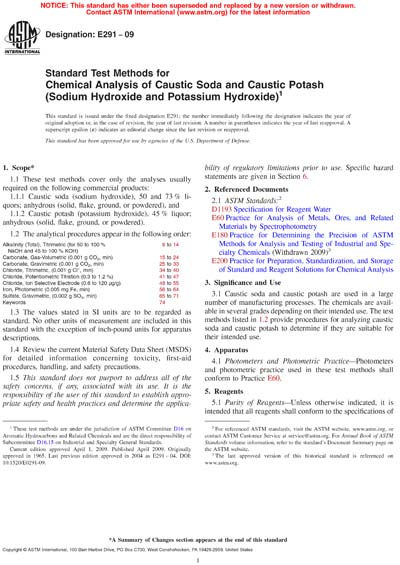Historical
ASTM E291-09
Standard Test Methods for Chemical Analysis of Caustic Soda and Caustic Potash (Sodium Hydroxide and Potassium Hydroxide)
1.1 These test methods cover only the analyses usually required on the following commercial products:
1.1.1 Caustic soda (sodium hydroxide), 50 and 73 % liquors; anhydrous (solid, flake, ground, or powdered), and
1.1.2 Caustic potash (potassium hydroxide), 45 % liquor; anhydrous (solid, flake, ground, or powdered).
1.2 The analytical procedures appear in the following order:
| Alkalinity (Total), Titrimetric (for 50 to 100 % NaOH and 45 to 100 % KOH) | 8 to 14 |
| Carbonate, Gas-Volumetric (0.001 g CO2, min) | 15 to 24 |
| Carbonate, Gravimetric (0.001 g CO2, min) | 25 to 33 |
| Chloride, Titrimetric, (0.001 g Cl−, min) | 34 to 40 |
| Chloride, Potentiometric Titration (0.3 to 1.2 %) | 41 to 47 |
| Chloride, Ion Selective Electrode (0.6 to 120 μg/g) | 48 to 55 |
| Iron, Photometric (0.005 mg Fe, min) | 56 to 64 |
| Sulfate, Gravimetric, (0.002 g SO3, min) | 65 to 71 |
| Keywords | 72 |
1.3 The values stated in SI units are to be regarded as standard. No other units of measurement are included in this standard with the exception of inch-pound units for apparatus descriptions.
1.4 Review the current Material Safety Data Sheet (MSDS) for detailed information concerning toxicity, first-aid procedures, handling, and safety precautions.
1.5 This standard does not purport to address all of the safety concerns, if any, associated with its use. It is the responsibility of the user of this standard to establish appropriate safety and health practices and determine the applicability of regulatory limitations prior to use. Specific hazard statements are given in Section 6. 8.1 This test method covers the determination of the total alkalinity of 50 and 73 % liquid caustic soda, 45 % liquid caustic potash, and anhydrous caustic soda and caustic potash. 15.1 This test method describes the gas-volumetric determination of sodium carbonate or potassium carbonate in caustic soda or caustic potash respectively. The lower limit of determination is 0.001 g as carbon dioxide. 25.1 This test method covers the gravimetric determination of carbonate in caustic soda or caustic potash. The lower limit of determination is 0.001 g as carbon dioxide. 34.1 This test method covers the volumetric determination of chloride in caustic soda or caustic potash by the Volhard test method. The lower limit of determination is 0.001 g as chloride. 41.1 This test method was developed for the analysis of chloride in caustic soda and caustic potash. It covers the potentiometric titration of 0.3 to 1.2 % of chloride in caustic soda and caustic potash. This test method may be applied to other concentrations by using equivalent sample weights. 49.1 This test method was developed for the analysis of chloride in caustic soda and caustic potash. It covers the ion selective electrode determination of 1 to 120 μg/g chloride in caustic soda and caustic potash. This test method may be applied to other concentrations by using equivalent sample weights. 58.1 This test method covers the photometric determination of iron in caustic soda or caustic potash. The lower limit of determination is 0.1 μg/g as iron. 67.1 This test method covers the gravimetric determination of sulfate present in caustic soda or caustic potash. The lower limit of determination is 0.002 g.
ASTM International [astm]

